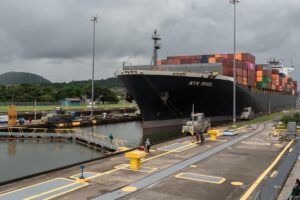Trump’s Threat Over the Panama Canal: Implications for Panama’s Economy and Sovereign Bonds
Recent tensions between President-elect Donald Trump and the Panamanian government are causing ripples across one of the world’s crucial trade arteries: the Panama Canal. This development is prompting serious concern among investors, as Panama’s bonds have taken a significant hit, reflecting the growing uncertainty surrounding the nation’s economic outlook.
In early trading, Panama’s bonds experienced the most considerable decline in emerging markets, highlighting the fragility of investor confidence amidst escalating geopolitical tensions. Trump’s aggressive stance includes a proposition to reassert U.S. control over the Canal unless the transit fees currently levied by Panama are adjusted downwards. Although Panamanian President José Raúl Mulino was quick to dismiss the threat, the mere possibility of a dispute over such a vital asset adds weight to investor apprehensions.
As is evident in the financial markets, the impact was immediate: notes due in 2036 fell by 0.7 cents on the dollar. Additionally, traders reacted by driving the cost of insuring against a sovereign default to its highest levels since February. These indicators signal that the market is not merely reacting to Trump’s remarks but also reevaluating the long-term stability of Panamanian financial health.
The Panama Canal has historically been a linchpin of the nation’s economy, serving as a vital cash source for the government. However, last year’s unexpected closure of a key copper mine further exacerbated Panama’s financial pressures. The weight of these two factors has raised alarms—Panama is now teetering on the brink of losing its investment-grade credit rating, having already faced multiple downgrades in recent times.
“The current geopolitical climate is additional attention that Panama doesn’t need right now,” noted Nathalie Marshik, a managing director at HSBC in New York. Indeed, the financial community is keenly aware that any sustained instability can disproportionately affect emerging markets like Panama, typically seen as riskier investments. As a result, bonds in this sector currently rank among the worst-performing assets, losing an alarming 8.5% this quarter alone, according to data compiled by Bloomberg.
For investors watching the situation unfold, now is a critical moment. Understanding the intersection of geopolitics and local economic conditions can provide invaluable insights into market movements. The key takeaway? Continued monitoring of the Panama Canal negotiations and their ensuing economic repercussions will be essential for anyone considering investments in Panamanian assets.
At Extreme Investor Network, we pride ourselves on delivering unique insights and analyses that go deeper than the headlines. Navigating through the complexities of the financial markets is what we do best, and we are committed to ensuring our readers are well-informed and strategically positioned to leverage these developments.
Stay tuned as we keep you updated on the evolving situation in Panama and its implications for global markets!

